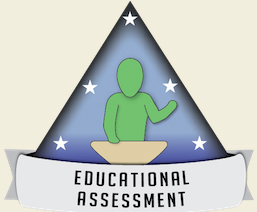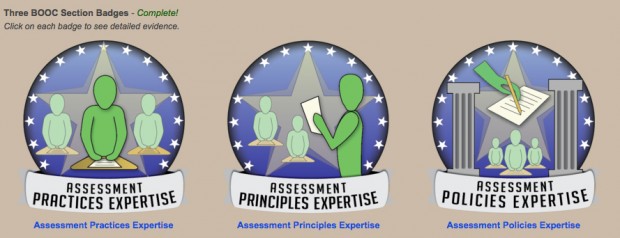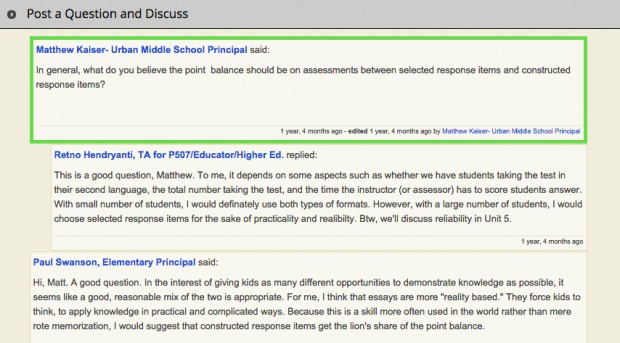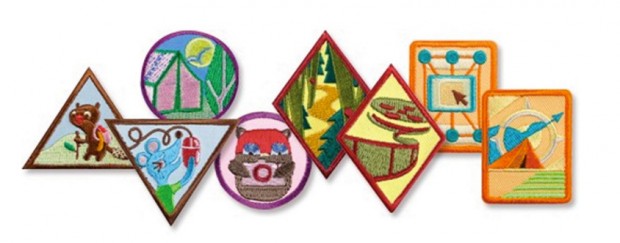Digital Badges Offer Students Opportunity To Show What They Know
If you’ve ever been a scout or you’re big into video games, you’ve probably earned your fair share of badges. Nowadays, applications like FourSquare and Fitbit grant users badges for hitting milestones or celebrating different achievements in travel and fitness.
They look something like this…
Whether you successfully learned how to build a proper fire, ran your first mile or finally moved onto “Level Four,” it’s an award you can proudly display to advertise your accomplishment to family and friends.
In recent years, the method of badging has translated into the academic setting. More schools in Indiana and across the country are granting badges to help students and teachers show what they know.
How do badges work?
A transcript is one of a student’s most valuable assets, whether they’re high school seniors trying to get into college or university students looking for their first job. The classes listed on that piece of paper tell admissions counselors and potential employers where a learner’s knowledge lies.
But beyond course titles and final grades, there isn’t much else. No description of what type of work a student completed, how they performed in class activities or what type of rapport they had with their professors and classmates.
That’s where digital badges come in.
- Digital Badges: Show What You KnowA transcript is one of a student’s most valuable assets, whether they’re high school seniors trying to get into college or university students looking for their first job. The classes listed on that piece of paper tell admissions counselors and potential employers where your knowledge lies. But what if you could actually show them what you learned, That’s where digital badges come in. As StateImpact Indiana’s Rachel Morello explains more Indiana schools are awarding these badges to supplement traditional class credit…Download
More Indiana schools are awarding these badges to supplement – or even replace – traditional class credit. including pilot programs at universities in the state such as IU, Notre Dame and Purdue.

The badge a student would earn for completing Hickey’s Educational Assessment course. (Photo Credit: Daniel Hickey/Matt Kaiser)
“They’re a way of recognizing accomplishment or learning, and it’s digital, which means it can be shared on the Internet easily, like you can post it on Facebook,” says learning sciences professor Daniel Hickey. He has studied and developed digital badges for students in his own classes at Indiana University.
In most cases, students are earning badges to show they’ve completed online courses, or certain sections of those courses. They’re then able to display them on their LinkedIn page or online portfolio to present to admissions counselors or potential employers.
Students in Hickey’s Educational Assessment course earn badges that, on first glance, look similar to the kind mentioned earlier, in video games or smartphone applications:

Students also earn a badge for completing each individual section of Hickey’s course. (Photo Credit: Daniel Hickey/Matt Kaiser)
But these badges go a step above the norm. What makes them unique signifiers is that they recognize things that can’t be listed on a school transcript – intangible skills like teamwork, professionalism, leadership or organizational skills.
“They have a lot of evidence in them,” Hickey explains, ticking off a list on his fingers. “Virtually all the work the students did, all their interactions with their peers, the number of times their peers promoted their work as being exemplary, their performance on the exam.”
For example, if you click on any badge a student has earned for completing an individual section of Hickey’s course, you’ll be directed to a page with detailed evidence displaying the assignments he or she completed to earn that badge:

Students’ various assignments are linked to the badges they earn. (Photo Credit: Daniel Hickey/Matt Kaiser)
In some cases, classmates can even promote their colleagues’ work as “exemplary” – a distinction that also shows up on the badges themselves:
How can badges benefit students?
The ability to actually show, rather than just tell admissions officials or potential employers what they know appeals to students.
That’s why Sandie Stringfellow, one of Hickey’s recent students, says she plans to highlight the badges she’s earned in her upcoming job search. They’re already prominently displayed on her LinkedIn page.
“I can list whatever I want on my LinkedIn, and say ‘I can totally do this, I can totally do this’ without substantiating those claims at all,” says Stringfellow, a doctoral candidate at the University of San Francisco. “The badge is sort of an opportunity to say, ‘yeah I did it, but also, here’s the evidence.’”
But will the folks doing the actual hiring know what they’re looking at?
—Arne Duncan, U.S. Secretary of Education
There are a lot of badge systems and each is unique. And that leads to the problem badges face: how do developers get employers across the country – or even across the state for that matter – to recognize what a certain badge means if those coming out of IU look different from those coming out of Purdue?
“The manufacturers were saying, ‘show us someone who has this badge who can do the job, and then we’ll get on board,’” Hickey recalls. “The educational systems were saying, ‘show us an employer who’s willing to hire someone who has this badge.'”
Experts say it will take awhile for badges to become more than just a passing fad. Widespread acceptance of badges as a sort of intellectual currency won’t happen unless everybody gets on board.
“The same way that an employer or an admissions officer really digs more deeply when they encounter something that’s unfamiliar, we would expect the same thing to happen with badges,” Hickey says. “The first time you see this badge, ‘Huh, what’s that? Drill, drill, drill, drill, drill.’ Next time you see that badge, ‘drill, drill.’ Next time you see that badge, ‘cool.’”
Despite their growing popularity, some experts say badges will never replace the more traditional methods of tracking professional or academic growth – they’ll always be supplemental.
But U.S. Secretary of Education Arne Duncan says its important academics continue to propel the technology forward. He has long been a proponent of badge technology and its potential to transform learning.
“Badges can help speed the shift from credentials that simply measure seat time, to ones that more accurately measure competency. We must accelerate that transition,” Duncan said in 2011. “Badges can help account for formal and informal learning in a variety of settings.”
Who else uses badges?
Another one of those settings is teacher training.

Northview Middle School principal Matt Kaiser earned digital badges as a student, and plans to help his teachers do the same. (Photo Credit: Drew Daudelin/WTIU News)
Educators at Northview Middle School in The Washington Township School district will soon earn digital badges when they complete professional development activities.
Northview Principal Matt Kaiser earned his first digital badge as a student in Hickey’s Educational Assessment course. The flexibility of the digital method intrigued him so much, that he decided it would be a perfect route to take with his own staff.
“[Its] really driven by how quickly you work at your own pace,” Kaiser says. “While I could just click through, the flexibility that exists for me to do it really on my time lends itself to giving it the attention that it deserves.”
Lori Kixmiller, an instructional coach at Northview its parent district, MSD Washington Township, says the digital badge method fits perfectly into the corporation’s ever-evolving professional development.
“[Professional Development] just in general has changed dramatically, especially with technology,” Kixmiller says. “It used to be a lot of ‘sit-and-get’ – a once a month department meeting, a once a month faculty meeting, and that was pretty much it. We’ve really worked hard to make it smaller, more intimate and more targeted so that it’s much more individualized.”
“Anything that we can explore that’s digital is smart, at this point,” she adds. “Teacher turnover is such a gigantic issue in the profession as a whole that anything we can do to make it more personal I think is really important.”
—Lori Kixmiller, Instructional Coach, MSD Washington Township
The Northview administration will begin implementing the pilot program as the current school year progresses. Kaiser says he’ll start by administering badges to group of eight to 12 teachers and scale up from there.
Teachers will receive badges & endorsements through the course which they can apply toward state-mandated “professional growth points” they’ll use to renew their teaching licenses. Kaiser also says their might be an opportunity in the future for teachers to earn a stipend along with their badges.
It’s also something school leaders hope can eventually trickle down into their K-12 students earning badges to supplement their report cards.
“I think as our teachers experience that more and more as a student, on their professional end, it opens up ideas and concepts that they can then bring into their classroom,” Kaiser says. “We’d be excited to see a point that we’d reach where our teachers might be able to use these badges with kids.”
Podcast: Play in new window | Download

